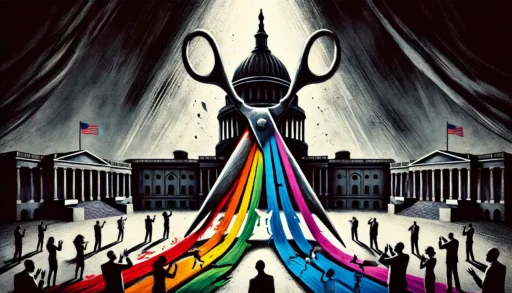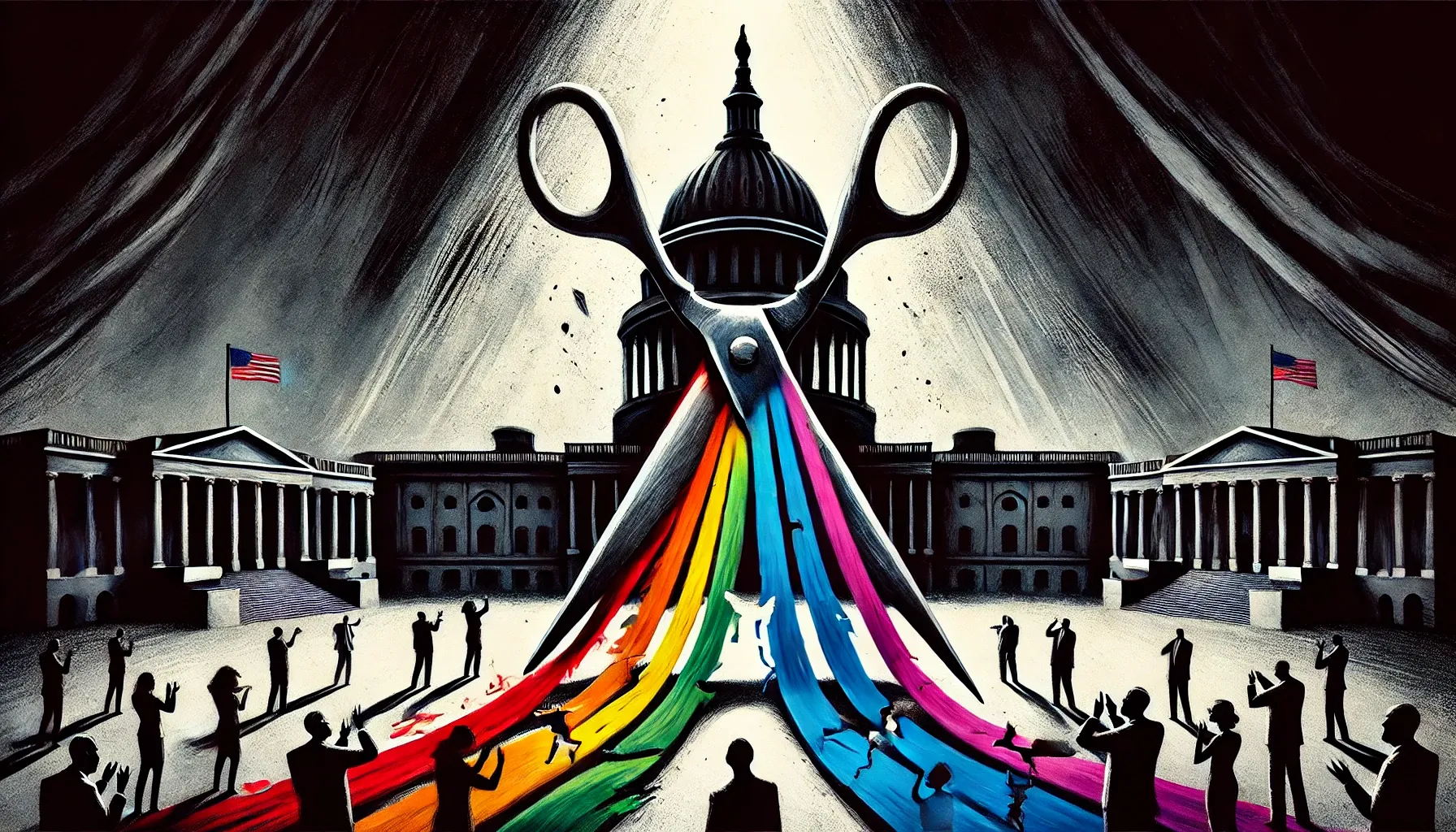Well, buckle up, buttercups, because the latest political rollercoaster on Capitol Hill is threatening to derail more than just a few brunch plans. Yes, we’re talking about the newly unveiled GOP reconciliation bill. While the ink is barely dry, the tremors are already being felt, especially within our vibrant LGBTQ+ community here in the District and across the nation. It seems some folks are sharpening their budget axes, and LGBTQ+ specific programs are square in the crosshairs. You know we at DistrictDrama.com live for the tea, but this particular brew tastes awfully bitter.
Now, for those of you whose eyes glaze over at the mere mention of “reconciliation,” let’s break it down. Think of it as Congress’s special VIP pass to fast track certain budget related legislation. It’s a powerful tool, often used to make sweeping changes with limited debate. Sounds efficient, right? Or perhaps, efficiently terrifying, depending on what’s on the chopping block. And this time, it appears the GOP reconciliation bill is aiming for a financial diet that could starve essential services. With the Supreme Court (SCOTUS) likely to rule in favor of parents who object to LGBTQ+ content in public schools, this is not a time for us to ignore other advances against the community.
The Billionaire Boon vs. Community Bust
So, what’s the grand plan behind this GOP reconciliation bill? According to the Human Rights Campaign (HRC), it’s a classic tale of robbing Peter to pay… well, to pay Paul, if Paul is a billionaire. The HRC’s scathing press release highlights a proposal to slash taxes for the ultra wealthy. And how, you might ask, are these generous tax cuts funded? You guessed it. By taking a legislative machete to programs that support some of our most vulnerable populations, including LGBTQ+ individuals. It’s a move that advocacy groups are, quite rightly, calling an “assault on equality.”
The sheer audacity is almost camp, if it weren’t so serious. We’re talking about initiatives that provide lifelines. These aren’t luxury items; they are fundamental support systems. Cutting them to give billionaires a break feels less like sound fiscal policy and more like a villain’s monologue in a poorly written play. But unfortunately, this drama is all too real, with potentially devastating consequences for communities.
Which LGBTQ+ Programs Are On the GOP Bill’s Hit List?
The proposed cuts detailed in the GOP reconciliation bill aren’t vague; they’re aimed at the heart of LGBTQ+ support networks. The Washington Blade’s recent report echoes the HRC’s alarm, noting the bill would “imperil critical LGBTQ specific programs.” So, what exactly is at stake?
Here’s a glimpse of the vital services facing the budgetary guillotine:
- Mental Health Services: Access to affirming mental healthcare is crucial, especially for LGBTQ+ youth who face disproportionately high rates of anxiety and depression. You can learn more about the need at The Trevor Project.
- Substance Use Disorder Treatment: Culturally competent treatment programs save lives. Slashing their funding is unconscionable.
- HIV/AIDS Initiatives: Decades of progress in fighting HIV/AIDS could be undermined. This includes prevention, testing, and treatment programs.
- Housing and Homelessness Prevention: LGBTQ+ individuals, particularly youth, are at a higher risk of homelessness. Programs providing safe shelter and support are essential.
- Community Violence Intervention Programs: These initiatives work to protect LGBTQ+ people, especially trans women of color, from violence.
Imagine a giant, metaphorical pair of shears, poised over these lifelines, with “GOP Reconciliation Bill” written on the handles. This isn’t just about numbers on a spreadsheet; it’s about people’s lives and safety.
The Ripple Effect: Beyond the Beltway
While we at DistrictDrama.com keep a keen eye on the happenings within our beloved city, the impact of this GOP reconciliation bill would ripple far beyond the Beltway. These are often federally funded programs that states and local organizations rely on. A cut at the federal level means less money trickling down to the grassroots organizations doing the heavy lifting in communities everywhere. For a city like DC, which prides itself on its inclusivity, such cuts would be a direct blow.
The proposed legislation is a stark reminder that progress isn’t permanent. Rights and resources hard won can be threatened by a single bill. It highlights the importance of vigilance and vocal opposition. Indeed, this isn’t just a policy debate; it’s a moral one. As the HRC puts it, trading essential human services for tax breaks for the wealthiest is “morally bankrupt.” It’s hard to argue with that assessment when you consider the tangible harm these cuts would inflict.
Understanding Reconciliation’s Power Play
It’s important to understand why the reconciliation process is such a potent, and often controversial, tool. Unlike regular legislation that can be filibustered in the Senate (requiring 60 votes to overcome), reconciliation bills only need a simple majority to pass. This makes it an attractive vehicle for pushing through partisan priorities on spending, revenues, and the debt limit.
This procedural advantage means that if a party controls the House, Senate, and White House, they can enact significant fiscal changes with little to no bipartisan support. Consequently, the GOP reconciliation bill, if it gains traction, could become law without the usual checks and balances of Senate debate. This is why alarm bells are ringing so loudly. The speed and limited scope for opposition make reconciliation a powerful, and in this case, potentially destructive, force.
What’s the Real Cost of These Cuts?
The architects of the GOP reconciliation bill will likely talk about fiscal responsibility and reining in spending. However, we must ask: responsible to whom? And at what cost? Slashing programs that prevent homelessness, provide mental healthcare, or combat HIV/AIDS doesn’t actually save money in the long run. Instead, it often shifts costs to emergency services, hospitals, and law enforcement, not to mention the immeasurable human cost.
Think about an LGBTQ+ teen who relies on a local center for support and mental health resources. If that center loses funding because of the GOP reconciliation bill, where does that teen go? The potential fallout includes increased rates of suicide, substance abuse, and homelessness. These aren’t abstract problems; they affect real people, our neighbors, our friends, and our family members. The National LGBTQ Task Force consistently highlights these systemic disparities.
A Call to Action: Don’t Just Sip the Tea, Spill It!
This GOP reconciliation bill is more than just another piece of legislation; it’s a direct challenge to the well being and security of the LGBTQ+ community. While the situation develops, staying informed is only the first step. The real power lies in collective action.
So, what can you, our savvy DistrictDrama readers, do?
First, get loud. Share this article. Talk to your friends, family, and colleagues. Let your elected officials know exactly where you stand on the GOP reconciliation bill and its proposed cuts to LGBTQ+ programs. Your voice matters, especially when it’s amplified.
Second, support the organizations on the front lines. Groups like HRC, The Trevor Project, and local LGBTQ+ centers will be fighting this tooth and nail. They need resources to continue their advocacy and provide services. Consider this your official invitation to get involved.
This fight is far from over. The details of the GOP reconciliation bill will continue to emerge, and the battle lines will be drawn. But one thing is certain: the LGBTQ+ community and its allies will not stand idly by while essential services are dismantled. Let’s make sure this particular DC drama has a plot twist that favors fairness and compassion.
What are your thoughts on the GOP reconciliation bill? How do you think these cuts would impact our community? Spill the tea in the comments below and share this post to spread the word!








